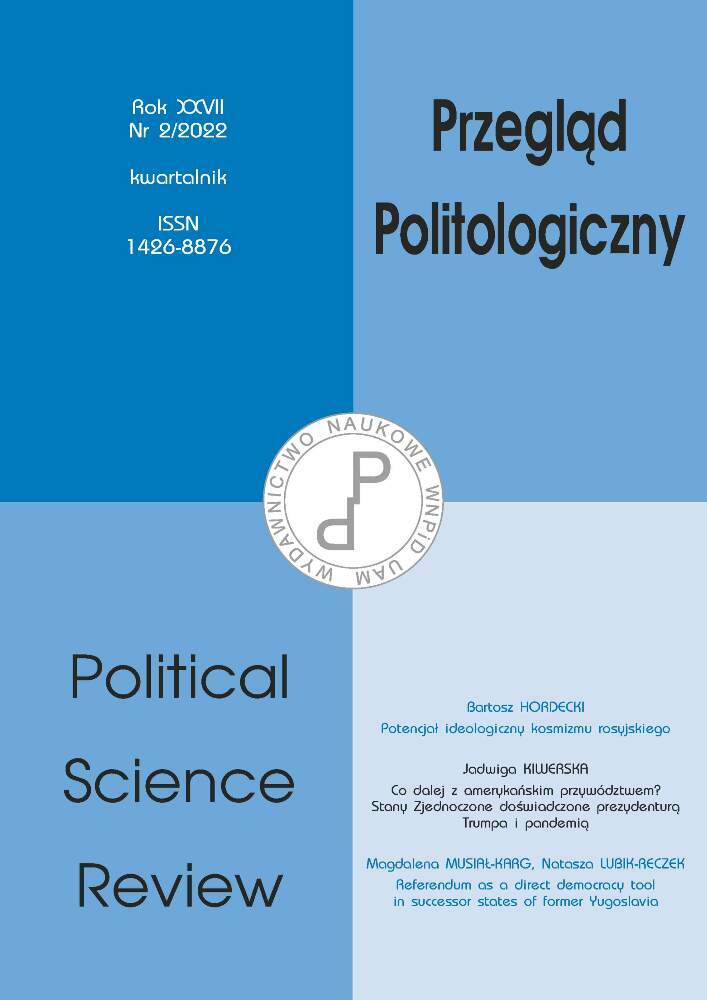Abstrakt
Po wyborach w 2017 roku radykalnie prawicowa Alternatywa dla Niemiec (AfD) stała się trzecią co do wielkości partią w Bundestagu. Choć powstanie AfD wzbudziło zainteresowanie naukowców, większość publikacji analizujących jej ewolucję ukazała się w okresie, gdy partia przechodziła transformację, kryzys euro stracił na znaczeniu, a partia przechodziła wewnętrzny konflikt między liberałami a radykałami. Niniejszy artykuł ma na celu systematyczne zbadanie, w jaki sposób te wydarzenia wpłynęły na partię w latach 2013-2017, i stara się odpowiedzieć na pytanie, czy AfD stała się bardziej mainstreamowa, wykorzystując ramy opracowane przez Akkerman et al., s. 1) zmiany w radykalnych stanowiskach w kluczowych kwestiach; 2) zmiany z partii niszowej na społeczno-ekonomiczną; 3) zmiany w profilu antyestablishmentowym; oraz 4) zmiany w reputacji partii. Poprzez analizę wewnętrznych i zewnętrznych materiałów, takich jak manifesty wyborcze, dokumentacja partyjna, opublikowane wywiady z liderami AfD oraz informacje prasowe, artykuł pokazuje, że AfD nie przesunęła się w stronę głównego nurtu. Zamiast tego, partia stała się bardziej radykalna w pierwszych trzech wymiarach, wykazując jednocześnie oznaki włączania się do głównego nurtu w czwartym wymiarze, aby uniknąć działań prawnych.
Bibliografia
Akkerman T., de Lange S. L., Rooduijn M. (2016), Radical right-wing populist parties in Western Europe: Into the mainstream?, https://doi.org/10.4324/9781315687988.
Althoff A. (2018), Right-wing populism and religion in Germany: Conservative Christians and the Alternative for Germany (AfD), “Z Religion Ges Polit”, 24.
Arzheimer K. (2015), The AfD: Finally a Successful Right-Wing Populist Eurosceptic Party for Germany, “West European Politics”, 8, pp. 9–10.
Arzheimer K. (2017), Die Alternative fuer Deutschland. Programmatik Entwicklung und politische Verortung, in: A. Haeusler, W. Springer, German Politics.
Basic Law for the Federal Republic of Germany (2018), German Bundestag.
Berbuir N., Levandowsky M., Siri J. (2014), The AfD and its Sympathisers: Finally a Populist Movement in Germany?, German Politics.
Briggs B. (2018), Far-right group with Tory links invites speakers from groups linked to neo-Nazis, https://www.dailyrecord.co.uk/news/uk-world-news/far-right-group-tory-links-13362615.
Chase, Deutsche Welle (n.d.), Far-right AfD enters German parliament: What it means for German politics, DW, 24.09.2017, http://www.dw.com/en/far-right-afd-entersgermanparliament-what-it-means-for-german-politics/a-406642.
Chase, Deutsche Welle, Frauke Petry, co-chair of the far-right AfD, to quit the party, 26.09.2017, http://www.dw.com/en/frauke-petry-co-chair-of-the-far-right-afd-toquit-the.
Chazan G. (2017, September 25), AfD leader splits with party after German election breakthrough, https://www.ft.com/content/96dee78c-a1c2-11e7-b797-b61809486fe2a.
Doering, Ein Jahr AfD im Bundestag: “Eine Bedrohung der Demokratie” (2018, November 13), https://www.vorwaerts.de/artikel/jahr-afd-bundestag-bedrohung-demokratie.
Ein Jahr AfD im Bundestag: “Eine Bedrohung der Demokratie” (2018, November 13). https://www.vorwaerts.de/artikel/jahr-afd-bundestag-bedrohung-demokratie.
Euronews (2017, September 25), Far-right AFD success shocks Germany, https://www.euronews.com/2017/09/25/far-right-afd-success-shocks-germany.
Frankland G. E. (1989), Parliamentary Politics and the Development of the Green Party in West Germany, “The Review of Politics”, 393.
Franzmann S. (2018), Extra-Parliamentary Opposition within a Transforming Political Space: The AfD and FDP under Merkel III between 2013 and 2017, “German Politics”, 8.
Franzmann T. S. (2014), Calling the Ghost of Populism: The AfD’s Strategic and Tactical Agen-dasuntil the EP Election,“German Politics”.
Grimm R. (2015), The rise of the German Eurosceptic party Alternative für Deutschland, between ordoliberal critique and popular anxiety, “International Political Science Review”, 274–275, 365–366.
Hansen M. A., Olsen J. (2018), Flesh of the Same Flesh: A Study of Voters for the Alternative for Germany (AfD) in the 2017 Federal Election, “German Politics”, 1.
Hölter K. D. (2018), AfD verklagt Ex-Chefin Frauke Petry, https://www.spiegel.de/politik/deutschland/afd-verklagt-ex-chefin-frauke-petry-a-00000000-0003-0001-0000-000002132992.
http://web.archive.org/web/20120923000310/http://www.wa2013.de/index.php?id=208.
Klemmensen R., Hobolt S. B., Hansen M. E. (2007), Estimating policy positions using political texts: An evaluation of the Wordscores approach, “Electoral Studies”, 26 (4). https://doi.org/10.1016/j.electstud.2007.07.00.
Klikauer T. (2018), Alternative for Germany: Germany’s new right-wing extremists, Wiley.
Laver M., Garry J. (2000), Estimating Policy Positions from Political Texts, “American Journal of Political Science”, 44(3), https://doi.org/10.2307/2669268.
Lees C. (2018), The ‘Alternative for Germany’: The rise of right-wing populism at the heart of Europe, 297.
Manifesto for Germany; The Political Programme of the Alternative for Germany (2017). https://tinyurl.com/yc8kmthy.
Meyer T., Wagner M. (2013), Mainstream or Niche? Vote-Seeeking Incentives and the Programmatic Strategies of Political Parties, “Comparative Political Studies”, 1247.
Mudde C. (2000), The concept of the party family, in: The ideology of the extreme right (p. 6), Bookcraft, Bolton.
Mudde C. (2007), Internal supply-side: the populist radical right party, in: Populist radical right parties in Europe (pp. 256–260), Cambridge University Press, Cambridge.
Mudde C. (2017, September 24), What the stunning success of AfD means for Germany and Europe, Cas Mudde, https://www.theguardian.com/commentisfree/2017/sep/24/germanyelections-afd-europeimmigration-merkel-radical-right.
Nasr J. (2018, October 18), German AfD members monitored by spy agency are now Bavarian lawmakers, https://www.reuters.com/article/us-germany-politics-afd/germanafdmembers-monitored-by-spy-agency-are-now-bavarian-lawmakers-idUSKCN1MS1VH.
Osborne L. (2018, November 07), Far-right German party expels member for photo of Hitler wine labels, https://www.theguardian.com/world/2018/nov/07/far-right-german-partyexpelsspokesperson-for-hitler-labels-photo.
Rinke A. (2017, August 29), Germany’s Merkel rules out coalition with far left, far right, https://www.reuters.com/article/us-germany-election-merkel-afd/germanys-merkel-rulesoutcoalition-with-far-left-far-right-idUSKCN1B929H.
Ruhose F. (2019), Die AfD im Parlament, in: Die AfD im Deutschen Bundestag. Essentials, Springer, Wiesbaden, https://doi.org/10.1007/978-3-658-23361-7_1.
Rydgren J. (2017), Radical right-wing parties in Europe – What’s populism got to do with it?, “Radical right-wing parties in Europe”, 493.
Schumacher E. (2018), German right-wing AfD party fears radicalization of youth wing, | DW |, https://tinyurl.com/46mxwtbb
Shalal A. (2018, September 04), To spy or not to spy? German parties split over AfD, https://www.reuters.com/article/us-germany-protests/to-spy-or-not-to-spy-german-partiessplit-overafd-idUSKCN1LJ15G.
Siri J. (2018), The Alternative for Germany after the 2017 Election, “German Politics”, 27:1, 141145, DOI: 10.1080/09644008.2018.1445724.
Wagner M., Meyer T. (2017), The Radical Right as Niche Parties? The Ideological Landscape of Party Systems in Western Europe, 1980–2014, “Political Studies/Sage”, 85.
Wählen Sie die Alternative! (2013), Web.Archive.

